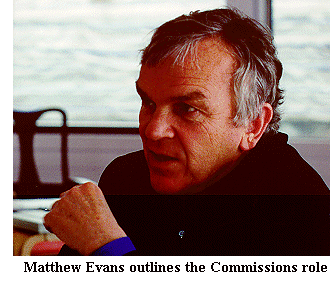View from the Hill
The Faber & Faber building in London’s Queen Square is smaller from the outside than one would imagine for such a prominent publishing company. In his third floor office, Matthew Evans, Chairman of Faber & Faber and Chairman also of the recently formed Library & Information Commission, pushed aside a pile of books on the table (we spoke over a copy of the recently published script of Trainspotting).
Our starting point was a quote from the critic, George Steiner (a Faber author), which Evans has used in recent talks. In the introduction to his recently published No Passion Spent: Essays 1978-1996, Steiner writes “The revolution … brought on by computers … is far more radical and comprehensive than was that initiated by Gutenberg. It is today fairly evident that … printed and bound books will be instruments of scholarship … and of luxury. As were illuminated manuscripts … after the invention of printing.” Evans himself does not fully subscribe to this view. For him, the future lies with both electronic and print publishing. He believes that the switch to digital publication will occur in a natural progression. “Reference works will be the first to make the transition. They can be used more efficiently in online mode, and they represent something like thirty or forty per cent of the total output of new books published each year. This is a revolution.”
As a company, Faber is investing in the digital future. Evans waves at a pile of documents on his desk. A small publisher has approached him with a request for  Faber to publish the works of its poets in electronic form. His response? “Oh yes indeed. We must engage with this quickly.” When it comes to student texts, Evans is reticent about specifying a timetable for a switch to electronic versions. “So many aspects of the form of electronic documents are not yet clear. If you allow students access to their set texts on the network, do you also allow them to download and print? If so, why publish the book at all?” One senses an awareness that publishers of the most popular student texts are beginning to feel the ground beneath them being undermined by the ‘anarchists’ who publish using the Net. “We can rail against them” he remarks, after noting that most of the poetry of T.S. Eliot is now available on the Net, “but this is the future, and it is efficient.”
Faber to publish the works of its poets in electronic form. His response? “Oh yes indeed. We must engage with this quickly.” When it comes to student texts, Evans is reticent about specifying a timetable for a switch to electronic versions. “So many aspects of the form of electronic documents are not yet clear. If you allow students access to their set texts on the network, do you also allow them to download and print? If so, why publish the book at all?” One senses an awareness that publishers of the most popular student texts are beginning to feel the ground beneath them being undermined by the ‘anarchists’ who publish using the Net. “We can rail against them” he remarks, after noting that most of the poetry of T.S. Eliot is now available on the Net, “but this is the future, and it is efficient.”
Our discussion moves towards libraries. Evans is tackling the post of Chairman of the Library & Information Commission with considerable energy. The problems of the public library system are foremost in the minds of Commission members. “Follett has kept up the morale of the higher education librarians - it has bought them a few years”. But public libraries are in a state of identity crisis. “One finds considerable uncertainty in public libraries about the future. One of the roles of the Commission is to stimulate original thinking.”
Many of the books on his table were new Faber publications; many were reports about libraries. Too many, Evans has argued on several occasions. The library community seems happy to produce reports but less happy when putting in place new services or planning to meet new challenges.
What about the Commission itself? Might public libraries be better served if their interests were represented within a larger Museums, Galleries and Library Commission, or even within the Arts Council? Evans feels that whatever advantages such an approach might have are outweighed by the benefits of independent representation. Their function is complementary to that of libraries in other sectors - in education and industry. But libraries are failing to recognise how complementary their roles are. He agrees that we are moving into an age when the nation’s ‘digital citizens’ will require access to a range of information and entertainment resources provided across the spectrum of library types. “This separation into sectors is dreadful. I have visited public libraries full of students, whose own university or college libraries refuse to admit members of the public”. As we move into the 21st century we need to think about the consumer and not the sector. “The Commission should pursue solutions which are cross-sectoral.”
If libraries fail to respond to the challenge, then the Commission will have failed in its objectives. More seriously, libraries may find themselves on the fringe of society. “There is a danger of being by-passed. ‘One-stop information shops’ have begun to emerge outside libraries, which is a great pity.” Entrepreneurs are waiting to convert into profit the opportunities which libraries are failing to meet. The spectre which Evans fears is of our libraries ending up as ‘museums of the printed word.’
The Commission is only beginning its work. It would be interesting to interview Matthew Evans again in a year’s time.
